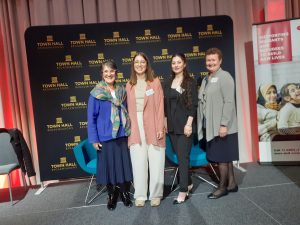Syrian, Iraqi refugees happy and settling well, survey finds
Refugees who arrived in Australia as a result of the conflicts in Syria and Iraq are thriving, feel welcome and are optimistic about the future, a new study has found.
 The final results of the ‘Refuge and family Futures in Australia’ research project show high levels of employment, English language proficiency and access to education.
The final results of the ‘Refuge and family Futures in Australia’ research project show high levels of employment, English language proficiency and access to education.
The research, carried out by the University of Technology Sydney in partnership with AMES Australia and other agencies around the country, examined the settlement outcomes of refugees from Syria and Iraq were who arrived in Victoria, NSW and Queensland between 2016 and 2018.
The study, encompassing three separate surveys, showed that overwhelmingly, settlement outcomes for the refugee families were positive.
The study found that after three years 55 per cent of refugees looking for work had secured employment. Over the same period, two in three adults from Syria and half of the Iraqis reported that they spoke English either well or very well.
From the first year, 90 per cent of refugees found their neighbourhood “a good place to bring up children”, rising to 98 per cent by the third year, the study found.
By the third year, 98 per cent of refugees also thought that their neighbour had good schools.
The study found that for young refugees, from year one, three in four rated their educational experiences as “very good” to “excellent”. Two in three felt that they belonged ‘most of the time’ or “always”.
It also found that most of the refugees wanted to become citizens and that their biggest worries were employment and family members trapped overseas.
Local federal MP Maria Vamvakinou, who officially launched the results at as event at the Broadmeadows Town Hall recently, said that migrants and refugees had always been contributors in the building of Australia as a modern nation.
“We see in our community every day the contributions that refugees are making both economically and also culturally,” she said.
Syrian refugee Angel Barboora, who arrived in Melbourne with her family in 2016, said coming to Australia had given her family a chance to rebuild their lives.
“We are grateful to the Australian Government and people for giving us refuge and a chance to have a new life,” Angel said.
“My family has been able to start a business and we are all loving our lives in Australia,” she said.
AMES CEO Cath Scarth said the positive settlement outcomes came at a time when record numbers of refugees were displaced across the globe.
“Recently we heard from UNHCR that there are now 120 million people across the globe forced to flee their homes because of war, violence or persecution,” Ms Scarth said.
“Forty-three million of these are refugees forced to flee to neighbouring countries and more than half are women and children. The number is an all-time record and represents the 12th year in a row it has increased with the global displaced population now equivalent to that of Japan.
“In the face of these stark numbers, it is important to remember that, as many countries around the globe are closing their borders, Australia has committed to maintaining what is one of the world’s most generous and sophisticated refugee settlement programs in the world.
“The study points to the fact that refugees can create shared prosperity when they are welcomed into new communities.
“They contribute to local economies by revitalising cities and rural communities, supporting local businesses, bringing diverse skills, creating jobs,” she said.
The study found the major worry of refugee families is employment and their family members, most often aged parents, who were still back in the homeland.
Syrian refugee Norma Medawar, who arrived in Australia in 2014 fleeing the civil war in her homeland, said she now felt Australia was her home.
“We have a great life in Australia now. We are safe, we have jobs and homes and our children can have bright futures,” said Norma, who recently visited Syria.
“While Syria will always be in my heart, Australia is now my home,” she said
The study says the key characteristics of the Syrian conflict intake are that most were Christians, and most were middle class.
Specifically, the majority of the Syrian and Iraqi refugee families (73 per cent) were Christian. In terms of education, 47 per cent of Iraqi refugee adults and 42 per cent of Syrians had prior tertiary education qualifications.
The report recommended better funding for refugee service provider agencies as well as individualised case management for refugee employment services.
It also recommended more support for refugees with a care responsibility and for volunteering initiatives.












